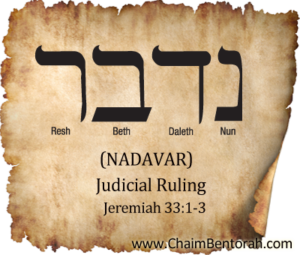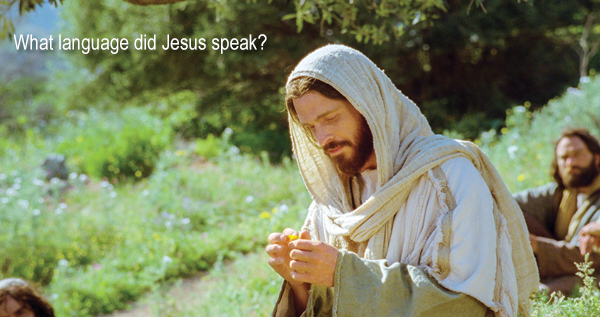Aramaic Word Study – Judicial Ruling – Nadavar: Nun Daleth Beth Resh
Jeremiah 33:1-3: Moreover the word of the LORD came unto Jeremiah the second time, while he was yet shut up in the court of the prison, saying, (2) Thus saith the LORD the maker thereof, the LORD that formed it, to establish it; the LORD is his name; (3) Call unto me, and I will answer thee, and shew thee great and mighty things, which thou knowest not.”
 Jeremiah found himself imprisoned for simply preaching the Word of God albeit it was a message of doom if the people refused to repent. There was a belief that the prophets themselves brought about their own fulfillment. That is, if the prophet prophesied that something good would happen, it would. If he prophesied something bad would happen that would happen. Thus, this poor prophet when given a message of doomed and it, therefore, was dooming him when he spoke the Word of God. It wasn’t much fun being a prophet of God.
Jeremiah found himself imprisoned for simply preaching the Word of God albeit it was a message of doom if the people refused to repent. There was a belief that the prophets themselves brought about their own fulfillment. That is, if the prophet prophesied that something good would happen, it would. If he prophesied something bad would happen that would happen. Thus, this poor prophet when given a message of doomed and it, therefore, was dooming him when he spoke the Word of God. It wasn’t much fun being a prophet of God.
So, here was poor Jeremiah, sitting in a prison when God comes to him a second time. That is not to say this is only the second time that the Word of the Lord came to Jeremiah, it came many times before. This was the second time on the same occasion and subject which contained a message of hope, the hope of a Messiah. Jeremiah was to be given some good stuff from God. However, God says He must first call unto Him and He will answer with a message of great and mighty things.
What is baffling for me is that Jeremiah is thrown into prison for preaching the message of God and God comes to Him with a Word. How does He come to Jeremiah? Does He send an angel, does He cause an earthquake to open the doors of his prison and a voice comes out of heaven with this word, does He make a personal appearance and sit down and have a chat with Jeremiah?
All we have is that the Word of the Lord came to Jeremiah. The word came in Hebrew is yihi from the root word hayah which simply means to exist, to be. This verb is in a simple Qal imperfect form or incomplete action however, it is preceded by a Vav conversive which changes it to a perfect or completed action form. Hence this could read: the Word of the Lord existed in Jeremiah. It was already there, a knowing and understanding. We may be crying out to God for understanding or a Word from Him and yet all the time it is there within us. How do we know what that message is?
Colossians 3:15 tells us: “And let the peace of God rule in your hearts, to the which also ye are called in one body; and be ye thankful.” The word to rule in Greek is brabeuó which means to arbitrate or umpire. You do not need an arbitrator or an umpire for an obvious call. That umpire is not waving his arms to say hi to the audience, he is signally a decision to an audience who does not know if a player is safe or out. That umpire calls the close ones. In the Aramaic, the word for the rule is nadavar which is a legal term for a judicial regulation or ruling. A judicial ruling is a final ruling on a matter. When that gavel hits the desk, that’s it, end of the story, all she wrote. It is the final decision. How do you know the final decision? It is the peace of God in your heart. The word peace in Greek is eiréné from the root word eirō, “to join, tie together into a whole.” In other words, a sense of wholeness or completeness. The word in Aramaic is shalam cognate to the Hebrew shalom which means to be complete, whole, and in harmony.
The message of God existed in Jeremiah and all God did was create a sense of peace and harmony with this message within Jeremiah. It is that feeling of the presence of God. A better way to understand this is to say when you consider whether or not something is of God and you feel a sense of peace, you feel God’s presence you know you have heard a message from God. It is even more clear if you are sitting in a prison cell like Jeremiah. The last thing you would expect to feel is a sense of peace. Yet Jeremiah felt that while sitting in prison, he felt God’s presence and he knew the message God was giving him was a true message.
Let’s follow the pattern here. First Jeremiah is tossed into prison. He is feeling pretty low. Then he suddenly feels God’s presence, everything is at peace, in harmony and God fills him with a message, a Word. In this peaceful rest, Jeremiah knows that if he calls upon God for a revelation God will give it to him and he will know it is a true revelation because that peace will continue. But he must ask God for this revelation. If he does God will reveal or show Jeremiah His message. The word in Hebrew for show or reveal is aggidah which comes from the root word nagad which means to become sensitive. God will make Jeremiah very sensitive to His message of mighty things. The mighty is gadal which means great and wonderful. Things are the word batsar which is the word for hidden, inaccessible. That would most likely be things in the future. Knowledge of the future is hidden and inaccessible to us.
So, poor Jeremiah may have found himself suffering imprisonment, but it wasn’t so bad, because God was filling him with peace and knowledge of things that would take place like the coming of the Messiah which would fill him with wonder. Rashi and the Targum interpret these mighty things as things reserved in the heart of God. In other words, God revealed his heart to Jeremiah and when God reveals His heart it creates a sense of peace and joy. Just think about when someone gives a testimony or sings a song from their heart, what happens? When a wife reveals her heart to her husband or the husband reveals his heart to his wife, what happens? There is a love connection taking place between the ones sharing their hearts and the ones listening. When God reveals His heart to you, He is creating a love connection.
The power of connecting to the racham love of God creates a sense of peace no matter how terrible your situation may be.
Hi there! Thank you for reading this Daily Word Study. Can I ask a favor? Share this Daily Word Study with your friends on Facebook and Twitter by clicking one of the icons below.
Thanks & Blessings, it means a lot to me!








Thank you. this has been very helpful in understanding this verse. Sometimes one can get a limited understanding of a verse, but this has expanded mine. Wonderful when God speaks through His peace in the soul.
Professor Chaim! Thank you for the Word study! So confirming!
Oh how God longs to connect with us and give us His peace.
This seems to be the subject our heavenly is relating to us lately the reassurance that peace is the evidence of His truth .Thank you
I throughly enjoy the scripture and the word study.